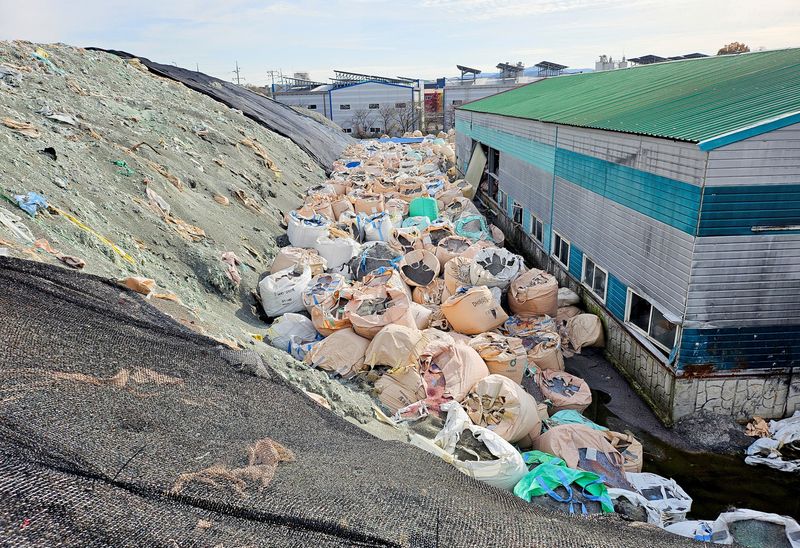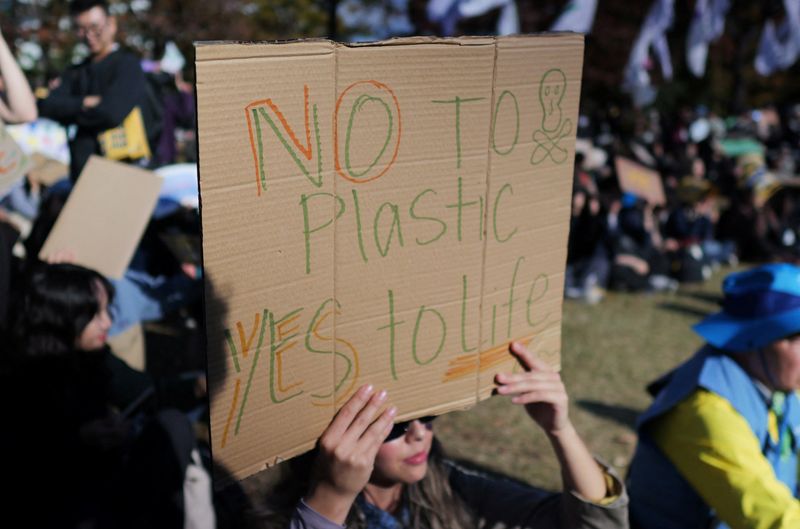By Valerie Volcovici and Joyce Lee
BUSAN/BAKU (Reuters) -As delegates from 175 countries gathered in Busan, South Korea on Monday for the fifth round of talks aimed at securing an international treaty to curb plastic pollution, lingering divisions cast doubts on whether a final agreement was in sight.
South Korea is hosting the fifth and ostensibly final U.N. Intergovernmental Negotiating Committee (INC-5) meeting this week, after the previous round of talks in Ottawa in April ended without a path forward on capping plastic production.
Instead, talks will be focused on chemicals of concern and other measures after petrochemical-producing nations such as Saudi Arabia and China strongly opposed efforts to target plastic production, over the protests of countries that bear the brunt of plastic pollution.
The divisions plaguing the plastics treaty talks echo conflicts that have long stalled U.N. efforts to curb global warming, with the most recent climate summit, COP29, having just ended with an agreement poorer nations assailed as inadequate.
INC Chair Luis Vayas Valdivieso told reporters on Monday he was confident this week's negotiations would yield a treaty or a text leading to a treaty.
"Without significant intervention the amount of plastic entering the environment annually by 2040 is expected to nearly double compared to 2022," Valdivieso said at the opening session in Busan on Monday.
"It is about humanity rising to meet an existential challenge," he said, noting that microplastics have been found in human organs.
The United States raised eyebrows in August when it said it would back plastic production caps in the treaty, putting it in alignment with the EU, Kenya, Peru and other countries in the High Ambition Coalition.
The election of Donald Trump as president, however, has raised questions about that position, as during his first presidency he shunned multilateral agreements and any commitments to slow or stop U.S. oil and petrochemical production.
The U.S. delegation did not answer questions on whether it would reverse its new position to support plastic production caps. But it "supports ensuring that the global instrument addresses plastic products, chemicals used in plastic products, and the supply of primary plastic polymers," according to a spokesperson for the White House Council on Environmental Quality.
Inger Andersen, executive director of the U.N. Environment Programme, on Monday urged delegates divided over curbing plastic products and chemicals and a financing mechanism to deal with plastic waste to remember that the 2022 U.N. Environment Assembly resolution called for "sustainable production and consumption of plastics taking a lifecycle approach".
IMPACT ON HEALTH
For a Pacific island country like Fiji, a global plastics treaty is crucial to protect its fragile ecosystem and public health, said Sivendra Michael, Fiji's climate minister and chief climate and plastics negotiator.
He told Reuters on the sidelines of the 29th U.N. Climate Change Conference this month that despite not producing any plastic, Fiji is bearing the brunt of its downstream pollution.
"Where do these plastics end up? It ends up in our oceans, in our landfill, in our backyards. And the impact of the plastics breaking down into little substances has detrimental effects, not only on the environment, but on us as individuals, on our health," he said, noting studies that showed most of the fish consumed in the country was polluted with microplastics.
While supporting an international treaty, the petrochemical industry has been vocal in urging governments to avoid setting mandatory plastic production caps, and focus on solutions to reduce plastic waste, like recycling.
"We would see a treaty successful if it would really put ... emphasis on ending plastic pollution. Nothing else should be the focus," said Martin Jung, president for performance materials at chemical producer BASF.
Previous talks have also discussed searching for forms of funding to help developing countries implement the treaty.
At COP29, France, Kenya and Barbados floated setting up a series of global levies on certain sectors that could help ramp up the amount of money that could be made available to developing countries seeking support to aid their clean energy transition and cope with the increasingly severe impacts of climate change.

The proposal included a fee of $60-$70/ton on primary polymer production, which is on average around 5-7% of the polymer price, seen potentially raising an estimated $25-$35 billion per year.
Industry groups have rejected the idea, saying it will raise consumer prices.
